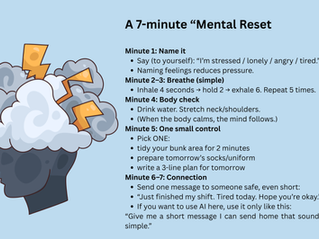10 Essential Insights for Multicultural Crew Members in Maritime Careers
- IMEQ CENTER

- Sep 4, 2025
- 3 min read
Starting a career at sea is not only thrilling; it can also feel overwhelming. For new crew members, the maritime industry serves as a diverse blend of cultures, generations, and experiences. As an organizational psychologist, I’ve seen firsthand how understanding this multicultural and multigenerational environment can pave the way for a successful career. This blog post highlights ten essential insights that every new crew member should consider before embarking on their maritime journey.

1. Embrace Cultural Diversity
The maritime sector is known for its rich cultural tapestry, with crew members from countries like the Philippines, India, Russia, and Greece. Each nationality contributes diverse customs, communication methods, and work ethics.
For example, a study by Deloitte revealed that diverse teams can be 35% more effective at problem-solving compared to uniform teams. By valuing this cultural richness, crew members can boost teamwork and foster a welcoming atmosphere.
2. Understand Generational Differences
Crew members might span different generations, from Baby Boomers to Generation Z. Each group has its unique values, work approaches, and communication styles.
For instance, Baby Boomers often value structured environments and direct communication, while Millennials may prefer teamwork and open dialogue. By recognizing these variances, crew members can enhance teamwork and foster better relationships onboard.
3. Communication is Key
In multicultural environments, effective communication is crucial. Language barriers can lead to confusion, so it's vital to communicate clearly.
Use simple, straightforward language, and avoid jargon that may be unfamiliar to others. Confirm understanding by summarizing key points, and encourage feedback. This promotes a more open and communicative environment across all crew members.
4. Build Relationships
Developing strong bonds with fellow crew members can greatly enrich your maritime experience. Invest time into getting to know your colleagues, sharing backgrounds and stories.
Research shows that good relationships can lead to a 50% increase in job satisfaction and team performance. Engage in social activities during downtime, which can help create bonds that last beyond your time at sea.
5. Adaptability is Essential
The maritime world can be unpredictable, shaped by fluctuating weather conditions and operational hurdles. Hence, being adaptable is key to thriving.
Studies highlight that resilient individuals, who embrace change, are more equipped to handle stress. Use challenges as chances to grow and learn. For example, adapting to a sudden change in schedule can help build resilience and enhance your skill set.
6. Respect Hierarchies and Protocols
The maritime industry operates with a clear hierarchy and established protocols, crucial for maintaining safety and order.
Get to know the chain of command and the roles of your fellow crew members. Understanding this structure not only helps you manage your responsibilities effectively but also fosters mutual respect, which is vital in a close-knit environment.
7. Prioritize Mental Health
Life onboard can be isolating, making mental health a significant concern. It’s critical to take care of your well-being and seek help when needed.
Data indicates that one in four crew members may face mental health issues, which can negatively impact safety and performance. Engage in self-care, keep a healthy work-life balance, and don’t hesitate to reach out to mental health resources if you’re feeling stressed.
8. Learn the Local Customs
Every port of call has its unique customs and regulations. Being aware of these can enhance your interactions with local communities and improve your maritime experience.
For instance, knowing local dining etiquette or greeting customs can make all the difference in establishing positive relationships. This knowledge not only smooths social interactions but also fosters goodwill with local stakeholders.
9. Safety First
Safety is crucial in maritime operations. Familiarize yourself with safety protocols, emergency procedures, and the locations of safety equipment onboard.
Research shows that a strong safety culture can cut incidents by as much as 70%. Engage actively in safety drills and encourage your teammates to prioritize safety, which ultimately protects everyone onboard.
10. Continuous Learning and Development
The maritime industry undergoes constant change, requiring ongoing learning and adaptation. Cultivating a mindset geared towards continuous improvement can greatly enhance your career.
Participating in training sessions, workshops, and mentoring can upgrade your skills and expand your knowledge base. Organizations that promote ongoing learning often see a 30% increase in employee engagement and job satisfaction.
Thriving in Uncharted Waters
Embarking on a maritime career is an incredible journey filled with opportunities for both personal and professional growth. By valuing cultural diversity, recognizing generational differences, and emphasizing communication and relationships, new crew members can navigate life at sea more effectively.
Keep in mind the importance of adaptability, respect for protocols, and prioritizing mental health and safety. These insights will equip you for success in the multicultural and multigenerational landscape of maritime work.
Navigating these waters may present challenges, but with the right approach, you can maximize your maritime experience. Welcome aboard!





































































































I was diagnosed with Parkinson’s disease four years ago. For over two years, I relied on Levodopa and several other medications, but unfortunately, the symptoms kept getting worse. The tremors became more noticeable, and my balance and mobility started to decline quickly. Last year, out of desperation and hope, I decided to try a herbal treatment program from NaturePath Herbal Clinic.Honestly, I was skeptical at first, but within a few months of starting the treatment, I began to notice real changes. My movements became smoother, the tremors subsided, and I felt steadier on my feet. Incredibly, I also regained much of my energy and confidence. It’s been a life-changing experience I feel more like myself again, better than I’ve felt…